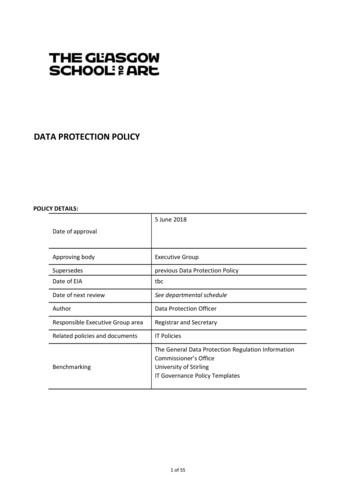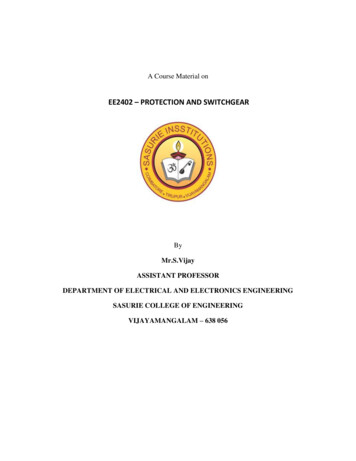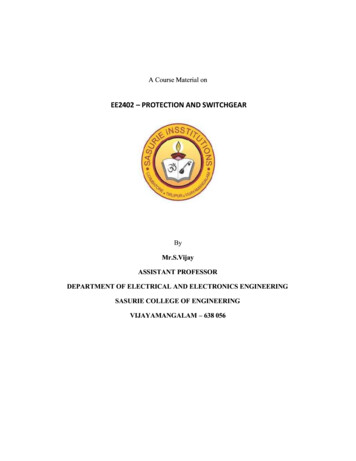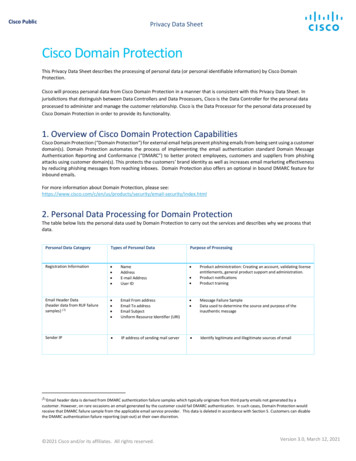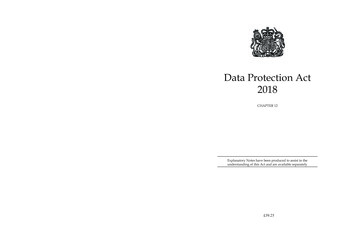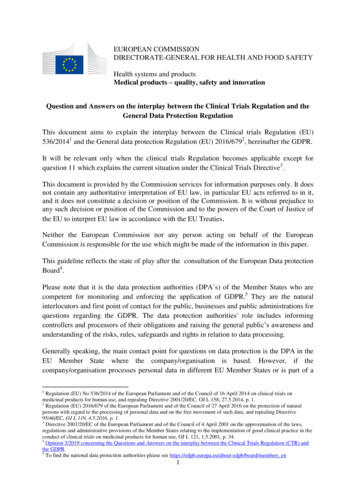
Transcription
EUROPEAN COMMISSIONDIRECTORATE-GENERAL FOR HEALTH AND FOOD SAFETYHealth systems and productsMedical products – quality, safety and innovationQuestion and Answers on the interplay between the Clinical Trials Regulation and theGeneral Data Protection RegulationThis document aims to explain the interplay between the Clinical trials Regulation (EU)536/20141 and the General data protection Regulation (EU) 2016/6792, hereinafter the GDPR.It will be relevant only when the clinical trials Regulation becomes applicable except forquestion 11 which explains the current situation under the Clinical Trials Directive3.This document is provided by the Commission services for information purposes only. It doesnot contain any authoritative interpretation of EU law, in particular EU acts referred to in it,and it does not constitute a decision or position of the Commission. It is without prejudice toany such decision or position of the Commission and to the powers of the Court of Justice ofthe EU to interpret EU law in accordance with the EU Treaties.Neither the European Commission nor any person acting on behalf of the EuropeanCommission is responsible for the use which might be made of the information in this paper.This guideline reflects the state of play after the consultation of the European Data protectionBoard4.Please note that it is the data protection authorities (DPA s) of the Member States who arecompetent for monitoring and enforcing the application of GDPR.5 They are the naturalinterlocutors and first point of contact for the public, businesses and public administrations forquestions regarding the GDPR. The data protection authorities' role includes informingcontrollers and processors of their obligations and raising the general public’s awareness andunderstanding of the risks, rules, safeguards and rights in relation to data processing.Generally speaking, the main contact point for questions on data protection is the DPA in theEU Member State where the company/organisation is based. However, if thecompany/organisation processes personal data in different EU Member States or is part of a1Regulation (EU) No 536/2014 of the European Parliament and of the Council of 16 April 2014 on clinical trials onmedicinal products for human use, and repealing Directive 2001/20/EC, OJ L 158, 27.5.2014, p. 1.2Regulation (EU) 2016/679 of the European Parliament and of the Council of 27 April 2016 on the protection of naturalpersons with regard to the processing of personal data and on the free movement of such data, and repealing Directive95/46/EC, OJ L 119, 4.5.2016, p. 1.3Directive 2001/20/EC of the European Parliament and of the Council of 4 April 2001 on the approximation of the laws,regulations and administrative provisions of the Member States relating to the implementation of good clinical practice in theconduct of clinical trials on medicinal products for human use, OJ L 121, 1.5.2001, p. 34.4Opinion 3/2019 concerning the Questions and Answers on the interplay between the Clinical Trials Regulation (CTR) andthe GDPR5To find the national data protection authorities please see https://edpb.europa.eu/about-edpb/board/members en1
group of companies established in different EU Member States, that main contact point maybe a DPA in another EU Member State. In the case of cross-border processing of personaldata: see Article 29 Working party Guidelines for identifying a controller or processor’s leadsupervisory authority.6 This section should be read together with the question and answerdocuments on the General Data protection Regulation (EU) 2016/679.7Q1. What are the general obligations of the Clinical Trials Regulation with regard topersonal data?The purpose of a clinical trial is to gather reliable and robust data on an investigationalmedicinal product. This fundamental principle is confirmed by Article 3(b) of the Clinicaltrials Regulation (CTR).From this basic principle stems the obligation on the sponsor/investigator to follow theapproved protocol and the good clinical practice principles (Article 47 of CTR).Additionally the CTR strengthens certain measures requiring the sponsor/investigator torecord, process, store and handle data in such a way that it can be accurately reported,interpreted and verified, while preserving the confidentiality of the records and requiringappropriate technical and organisational measures to protect information and personal data(Article 56 of CTR).In addition to that, the sponsor is legally obliged by the CTR to carry out a range of activities(including those detailed in chapter VIII of the CTR) for instance:-report the results of that trial (Article 37(4) and (8) of CTR);perform the safety reporting (Articles 41-43 of CTR); andarchive the clinical trials master file for 25 years and the medical files of subjects forthe time period as prescribed by national law (Article 58 of the CTR)8.The sponsor is subject to Member States inspections (Article 78 of CTR) in the context ofwhich Member States' GCP9 inspectors are entitled to have access to clinical trial data (Article24 of Directive 2005/28/EC and Article 10(2) of Commission Implementing Regulation (EU)2017/556) and in the latter Regulation, also the individual patient records.The clinical trial protocol, authorised under the CTR, defines the purposes and conditions forwhich the data of clinical trial subjects will be processed. Subjects should be properlyinformed on the processing of his/her personal data (see reform-eu-data-protectionrules eform-eu-data-protectionrules en.8As regards the data of a clinical trial that will be used to support the marketing authorisation application, the retentionperiod pursuant to the CTR takes precedence over the obligations in Annex I of Directive 2001/83/EC. Thus, compliancewith the requirements of Article 58 of the CTR is required also when using the data of the clinical trial to support theMarketing authorisation applications as regards the data retention periods.9GCP: Good clinical practices.2
In addition to this, it must be noticed that Article 93 of the CTR provides that “Member Statesshall apply Directive 95/46/EC [now repealed by the GDPR] to the processing of personaldata carried out in the Member States pursuant to this Regulation” and that “Regulation(EC) No 45/2001 [repealed by Regulation 2018/1725] shall apply to the processing ofpersonal data carried out by the Commission and the Agency pursuant to this Regulation”.The GDPR as well makes express references to the relevant legislation applicable to clinicaltrials10. It follows that both legislations apply simultaneously.Q2. Who is responsible for determining the correct legal basis for personal dataprocessing in the context of clinical trial?According to the principle of accountability, it is the obligation of the data controller(sponsor/clinic-institution of the investigator) to implement the appropriate technical andorganisational measures to ensure and be able to demonstrate that the personal data areprocessed in accordance with the data protection rules (Article 24 of GDPR). The controllermust ensure compliance of the processing operations carried out in the context of a clinicaltrial with all the data protection rules in GDPR (including ensuring respect of the dataprotection principles, providing information on the processing to data subjects, appointing aData Protection Officer where required, maintaining records of processing activities,facilitating the exercise of individuals’ rights, etc.). It stems from above, that the controller(sponsor/clinic-institution of the investigator) is responsible to determine the legal basis forprocessing of personal data.In case of questions please consult the data protection authorities (DPA s) established in theMember States11. Regarding cross-border processing by one data controller a lead DPA willcoordinate the cooperation of all the DPAs concerned in order to ensure consistency (Article56 of the GDPR).12 Regarding multiple investigators, DPAs will need to cooperate.Q3. What is the legal basis for processing of personal data of clinical trial subjects in thecontext of clinical trials (primary use) carried out in accordance with the Clinical TrialRegulation?All processing operations related to a specific clinical trial protocol during its whole lifecycle,from the starting of the trial to deletion at the end of the archiving period including data inmarketing authorisation, shall be understood as primary use of clinical trial data. Not allprocessing operations relating to such “primary use” of clinical trial data pursue the samepurposes and fall within the same legal basis.The overall objective of the CTR is to achieve a harmonised internal market as regardsclinical trials and medicinal products for human use, taking as a starting point a high level of10Recital 156 and recital 161 of the -detail.cfm?item id 612080.12See Article 29 Working party Guidelines for identifying a controller or processor’s lead supervisory em-detail.cfm?item id 611235.3
protection of health, while setting high standards of quality and safety for medicinal productsby ensuring that data generated in clinical trials are reliable and robust 13.The overall objective of the GDPR is to protect fundamental rights and freedoms of naturalpersons and in particular their right to the protection of personal data. For transparencyreason, protection of personal data should be at the centre of the data controllers ‘decision.In particular, processing operations purely related to research activities must be distinguishedfrom processing operations related to the purposes of protection of health, while settingstandards of quality and safety for medicinal products by generating reliable and robust data(reliability and safety related purposes); these two main categories of processing activities fallunder different legal bases.1. Processing operations related to reliability and safety purposesThe processing operations which are necessary for compliance with a legal obligation towhich the controller is subject may be justified under Article 6(1) (c) of the GDPR. The legalobligations to which the sponsor and/or the investigator are subject to may be expresslyprovided by the CTR and by relevant Union and national provisions.This is notably the case, for instance, for obligations relating to the performance of safetyreporting under Articles 41 to 43 of the CTR, and obligations concerning the archiving ofthe clinical trial master file (25 years according to Article 58 CTR) and the medical files ofsubjects (which is to be determined by national law according to the same provision). Thesame applies to any disclosure of clinical trial data to the national competent authorities in thecourse of an inspection in accordance with relevant national rules (see Article 78 CTR).The corresponding appropriate condition for lawful processing of special categories of data inthe context of these obligations shall be Article 9(2)(i): “processing is necessary for reasonsof public interest in the area of public health, such as [.] ensuring high standards of qualityand safety of health care and of medicinal products or medical devices, on the basis of Unionor member State law, which provides for suitable and specific measures to safeguard therights and freedoms of the data subject, in particular professional secrecy”.2. Processing operations purely related to research activities14Processing operations purely related to research activities in the context of a clinical trialcannot, however, be derived from a legal obligation. According to the European Dataprotection board (EDPB, the processing of personal data is lawful and falls under one of thethree legal bases, depending on the whole circumstances attached to a specific clinical trial:13Recital 82 CTR and Article 3(b) CTR.Article 29 Working Party Guidelines on consent under Regulation 2016/679 of 10 April 2018, p. 27 states thatthe notion of scientific research may not be stretched beyond its common meaning and understand that ‘scientificresearch’ in this context means a research project set up in accordance with relevant sector-relatedmethodological and ethical standards, in conformity with good practice.144
-a task carried out in the public interest under Article 6(1) (e) in conjunction withArticle 9(2), (i) or (j) of the GDPR; orthe legitimate interests of the controller under Article 6(1) (f) in conjunction withArticle 9(2) (j) of the GDPR; orunder specific circumstances, when all conditions are met, data subject’s explicitconsent under Article 6(1) (a) and 9(2) (a) of the GDPR.2.1Public interestArticle 6 (1) (e) allows processing of personal data where such processing is necessaryfor the performance of a task carried out in the public interest, on the basis of an EU ornational law. The Clinical Trials Regulation defines by law certain processing activities,which are necessary for the performance of a task carried out in the public interest forpurposes outlined in the approved clinical trial protocol, in this case to pursue thegeneral public interest of the Union in safeguarding public health. Therefore, in suchcases EU law provides the legal basis for the processing of personal data gathered in thecontext of clinical trials. The processing of personal data in the context of clinical trialscan thus be considered as necessary for the performance of a task carried out in thepublic interest when the conduct of clinical trials directly falls within the mandate,missions and tasks vested in a public or private body by Union or national law.The legal basis identified under Article 6 shall be supplemented with the condition forprocessing special categories of data under Article 9 of the GDPR. Depending on thespecific circumstances of a clinical trial and on the legal basis used as described above,the appropriate Article 9 condition for all processing operations of sensitive data forpurely research purposes could be “reasons of public interest in the area of public health[.] on the basis of Union or Member State law” (Article 9(2)(i)), or “scientific .purposes in accordance with Article 89(1) based on Union or Member State law”(Article9(2)(j)).2.2Legitimate interestFor other situations where the conduct of clinical trials cannot be considered asnecessary for the performance of the public interest tasks vested in the controller bylaw, the processing of personal data could be “necessary for the purposes of thelegitimate interests pursued by the controller or by a third party, except where suchinterests are overridden by the interests or fundamental rights and freedoms of the datasubject” following Article 6(1) (f) GDPR.2.3ConsentUnder the GDPR, consent must be freely given, specific, informed, unambiguous, andwhere consent is used as a justification for processing special categories of data, such ashealth data, such consent must be explicit (Article 9(2) (a) GDPR). Data controllersshould pay particular attention to the condition of a “freely given” consent. As stated inthe Working Party 29 Guidelines on consent, this element implies real choice and5
control for data subjects. Besides, consent should not provide a valid legal ground forthe processing of personal data in a specific case where there is a clear imbalancebetween the data subject and the controller.Depending on the circumstances of the clinical trial, situations of imbalance of powerbetween the sponsor/investigator and participants may occur. The CTR expresslyaddresses these risks and requires the investigator to take into account all relevantcircumstances, in particular whether the potential subject belongs to an economically orsocially disadvantaged group, or is in a situation of institutional or hierarchicaldependency that could inappropriately influence her or his decision to participate15.As explained in the Guidelines on consent of the Working Party 29, consent will not bethe appropriate legal basis in most cases, and other legal bases than consent must berelied upon (see above alternative legal bases).Q4. What is the difference between informed consent within the meaning of the clinicaltrial Regulation and consent within the meaning of the GDPR?The requirement of informed consent by the CTR must not be confused with consent as alegal ground for processing personal data set out in Article 6(1) (a) of the GDPR.The Clinical Trials Regulation contains several provisions that specify certain aspects on howthe processing of personal data should take place. Informed consent required by thatRegulation serves as an ethical standard and procedural obligation. The informed consentunder CTR is the fundamental condition under which a person can be included into a clinicaltrial. It is not conceived as an instrument for data processing compliance.Informed consent, in the context of CTR, is a safeguard not a legal basis for data processing.Therefore, it is important to distinguish between the requirement for consent for a subject toparticipate in a CT and the requirements for a lawful processing of personal data under theGDPR (see Q&A 3).Q5. How to understand the requirements of the GDPR regarding information thatshould be given to subjects participating in a clinical trial?Any person included in a clinical trial should receive the relevant information related to theclinical trial as required by the CTR as well as the information according to Article 13 of theGDPR, in particular the legal basis for data processing (see Q&A 3).Q6. What are the legal consequences of withdrawal of the consent for participation inthe clinical trial under the Clinical Trial Regulation?Article 28(3) of the CTR states that withdrawal of the informed consent to participate in aclinical trial shall not affect any activities already carried out and the use of data obtained onthe basis of the informed consent before that withdrawal. .15Recital 31 CTR.6
Consent for participation in clinical trial must be distinguished from the consent forprocessing personal data in the context of that clinical trial (see Q&A 4).The withdrawal of consent to participate in a clinical trial under CTR may not necessarilyaffect the processing of personal data gathered in the context of that trial. The personal datamay continue to be processed where there is an appropriate legal basis for such processingunder GDPR. In such cases, the personal data of that person gathered before the withdrawalshall be kept for the purposes and in the conditions defined by the protocol and the legislation.For example, if serious adverse reaction occurs to the patient, the sponsor has the rights toprocess the data by reporting the data to the national competent authorities (based on the legalobligation of the controller Article 6(1) c of the GDPR in conjunction with Article 9(2)i.Under the GDPR, if consent is used as the lawful basis for processing (Article 6(1) a), theremust be a possibility for individuals to withdraw that consent at any time (Article 7(3)), andthere is no exception to this requirement for scientific research provided for under Article 7.As a general rule, if consent for data processing under GDPR is withdrawn, all dataprocessing operations that were based on consent remain lawful in accordance with the GDPR(Article 7(3)); however, the controller shall stop the processing actions concerned and if thereis no other lawful basis justifying the retention for further processing, the data should bedeleted by the controller (see Article 17(1) (b) and (3) GDPR). In cases where personal dataare processed on the basis of consent under GDPR, it is appropriate for the investigator todetermine with the trial subject whether their withdrawal of consent under CTR relates solelyto participation in trial activities or whether they also withdraw consent to the processing oftheir data.However, the withdrawal of consent under the CTR does not affect the processing operationsthat are based on other lawful grounds, in particular legal obligations to which thesponsor/investigator are subject such as the ones related to safety purposes.Q7. What is the meaning of Article 28(2) of the CTR and what are the implications forthe use of personal data outside the protocol of the clinical trial (secondary use) withinthe scope of the GDPR?The CTR explicitly refers to the situation where consent may be sought from the clinical trialsubject for the use of personal data concerning that subject outside that clinical trial protocolfor future scientific purposes (Article 28(2) of the CTR).Secondary use of data which is anonymised does not fall within the scope of the GDPR. Bycontrast, in case of processing of personal (including pseudonymised) data outside of the CTprotocol the following must be considered:If a sponsor/investigator would like to use the personal data gathered for any other purposesthan the one defined by the clinical trial protocol (e.g. medical data collected to conduct aclinical trial on breast cancer used to run a study aiming to identify new biomarkers, butwhich was not foreseen in the clinical trial protocol), it would require a valid legal ground7
under Article 6 of the GDPR16 (see question 3 for the legal basis). The chosen legal basismay or may not differ from the legal basis of the primary use.Due account must be taken of Article 5(1)(b) of the GDPR which provides for a presumptionof compatibility of purposes, subject to the conditions set for in Article 89(1) GDPR, whenfurther processing is carried out for purposes of scientific research. In any event, even whenthe presumption of compatibility is found to apply , the scientific research making use of thedata outside the protocol of the clinical trial must be conducted in compliance with therelevant legal basis and all other relevant applicable provisions of data protection law asstated under Article 28(2) CTR. Therefore, the controller is not exempt from the otherobligations under data protection law, for example with regard to fairness, lawfulness,necessity and proportionality, as well as data quality.Where consent (Article 6(1) (a) of the GDPR) is sought to be used as a legal basis for theprocessing of personal data for secondary use, the following considerations should be takeninto account:-The GDPR requires that personal data is collected for specified, explicit andlegitimate purposes and not further processed in a manner that is incompatible withthose purposes. Further processing for scientific research purposes shall, inaccordance with Article 89(1), not be considered incompatible with the initialpurposes (Article 5(1) (b)).- Pursuant to Article 4(11) of the GDPR, consent of the data subject means any freelygiven, specific, informed and unambiguous indication of the data subject's wishes bywhich he or she, by a statement or by a clear affirmative action, signifies agreement tothe processing of personal data relating to him or her17.- Pursuant to Article 7(3) of the GDPR, an individual has the right to withdraw his/herconsent at any time during the conduct of the clinical trial. Data subjects should begiven this information prior to giving consent to participate in the clinical trial.- As regards consent for processing personal data for the purpose of scientific research,it is further clarified in Recital 33 of the GDPR: "It is often not possible to fullyidentify the purpose of personal data processing for scientific research purposes atthe time of data collection. Therefore, data subjects should be allowed to give theirconsent to certain areas of scientific research when in keeping with recognisedethical standards for scientific research. Data subjects should have the opportunity togive their consent only to certain areas of research or parts of research projects tothe extent allowed by the intended purpose."- Recital 33 brings some flexibility to the degree of specification of consent and allowsthat the purpose may be described at a more general level. Yet it must be interpreted ina strict manner and requires a high degree of scrutiny. It should be noted that theobligations with regard to the requirement of specific consent still apply, despite the1617The same applies when allowing access to the individual patients' records by third country inspectors.See also Article 7 of the GDPR for additional general conditions for consent.8
---flexibility of recital 33. This means that, in principle, scientific research projects canonly include personal data on the basis of consent if they have a well-describedpurpose.Therefore, the sponsor may either seek consent of the subject for a secondary usealready in the beginning of the clinical trial (the first use). Here it is important to notethat this form of consent must strictly be distinguished from the informed consent inthe context of the CTR. The sponsor must ask separately for consent of dataprocessing within a secondary use (using different consent sheets) and has to indicatethe specific research purposes of this use.On the other hand if the aim of using the data for further research outside the protocolof the CT arises after the clinical trial has been completed, the sponsor must go back tothe data subjects for specific consent.In any case the sponsor/investigator must inform the subject according to Article 13 ofthe GDPR (e.g. on the legal basis and the right to withdraw consent) (see Q&A5).Q8. Processing of personal data in the context of emergency clinical trials (Article 35 ofthe CTR)Once the strict conditions of Article 35 of the CTR are fulfilled, a subject can be enrolled in aclinical trial in the situation of emergency, exceptionally without any prior informed consent.Following an intervention, the informed consent should be sought from a subject or his or herlegal representative as soon as possible in order to maintain the subject in the clinical trial. Incase a subject/legal representative does not confirm his/her consent, the participation of thesubject cannot be continued.As the prior informed consent of the subject is only an additional safeguard and not the legalbasis for the processing from a data protection perspective, the legal basis for the processingof personal data in the context of emergency clinical trials remains the public interest pursuedin Article 6(1) (e) of the GDPR or the legitimate interest pursued in Article 6(1) (f) of theGDPR. In addition, the initial processing, necessary to provide a person with a treatment andto record its outcomes, in the absence of consent in the meaning of Article 28 of the ClinicalTrial Regulation, can also be justified on a ground of vital interests of the data subject (Article35 of the CTR in conjunction with Article 6(1) (d) and Article 9(2) (c) of the GDPR).In light of Article 35(3) of the CTR in case participation in a trial will not be confirmed by theex-post informed consent given by that person or his/her legal representative, that person orlegal representative should be informed of the right to object to use the data gathered initially.If the person confirms its participation in a trial, data can be further processed for the purposeof that trial.If a data subject dies before the consent could be confirmed/refused, the processing of thatdata is no longer covered by the GDPR and the conditions for processing may be determinedby national law.Q9. Is a sponsor established in third country subject to EU data protection rules?9
The GDPR applies to controllers and processors established in the EU as well as to controllersand processors not established in the EU where the processing activities are related to theoffering of goods or services to data subjects in the EU or the monitoring of their behaviour inthe EU (Article 3 GDPR). Where the sponsor processes personal data of data subjects in theEU related to these purposes, including in the context of managing the clinical trial, theGDPR is fully applicable, including the obligation to designate a representative in the EU(Article 27 GDPR).Q10. What rules apply to the data transfers outside the EU?Entities in the EU that transfer personal data to an entity outside the EU (e.g. to controllers,processors or other recipients in third countries or to international organisations18) have tocomply with the rules on international transfers (Chapter V of the GDPR). The GDPR has notchanged the rules that already existed under Directive 95/46 (and that have been in place formore than 20 years), but expanded the possibilities to use existing transfer instruments andintroduced new transfer tools. This allows EU entities to adopt the approach that is mostsuitable for their specific situation. Depending on the situation, transfers can for example takeplace on the basis of an adequacy decision (i.e. where the Commission has decided that a thirdcountry or international organisation ensures an adequate level of protection), on the basis ofan agreement or arrangement that contains appropriate data protection safeguards (Article 46GDPR), or on the basis of one of the derogations listed in Article 49 GDPR (e.g. for importantreasons of public interest).Q11. How should a sponsor proceed in the case of clinical trials authorised under theClinical trials Directive?For new clinical trial applications that will be submitted for authorisation under the clinicaltrial Directive until the Clinical Trial Regulation enters into application, the sponsor shouldcontinue to follow the rules in light of the respective national laws transposing the clinicaltrials Directive.In case of clinical trials authorised under the CTD that are already ongoing the sponsorshould consider the following aspects:- The legal basis:The legal basis for processing
regulations and administrative provisions of the Member States relating to the implementation of good clinical practice in the conduct of clinical trials on medicinal products for human use, OJ L 121, 1.5.2001, p. 34. 4 Opinion 3/2019 concerning the Questions and Answers on the interplay between the Clinical Trials Regulation (CTR) and the GDPR



